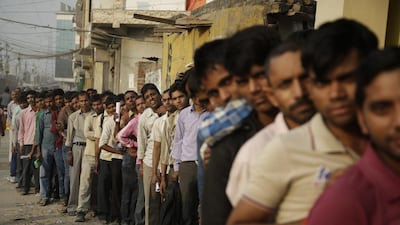LUCKNOW // The engineer was in the middle of his evening meditation when a colleague called and told him to turn on the television. Prime minister Narendra Modi was announcing that most of India’s cash would hold no value by morning.
The objective was to rid the country of illegal “black money” for which taxes had not been paid. Money often associated with illegal activity such as bribery. Money like the 4.8 million rupees (Dh257,415) stashed in a steel trunk in the engineer’s bedroom.
“For first few minutes I could not understand,” the engineer said, speaking on condition of anonymity for fear of prosecution.
The engineer, employed by Uttar Pradesh state government’s public works department, and many of his colleagues had amassed piles of cash by taking bribes for public contracts – a practice so common it has become accepted by many as part of the price of doing business in India. They felt confused – even betrayed – by the government cracking down.
“A bribe is not a taboo in a government job,” the engineer said.
Mr Modi, in his November 8 address, announced the demonetisation of India’s 500 and 1,000-rupee notes, which made up 86 per cent of the country’s currency. He said it would wipe out rampant corruption, though in a country of 1.3 billion where most people do not have bank accounts, it also wiped out legally collected savings.
“With this decision we have, in one stroke, hit at the root of the sources of corruption,” finance minister Arun Jaitley said the next day. “We have freed up the country from these sources of corruption.”
Demonetised currency can be deposited in banks, but the government said it would penalise those who deposited amounts that did not match their income. Anyone depositing more than 250,000 rupees over the next two months will be flagged for tax inspection.
On the phone with friends, the engineer said, “I sensed desperation in their voices. I knew they also had bribe money” in amounts high enough to raise red flags.
Did he feel shame, or guilt? No.
“Taking this extra money as commission is a necessity” just to meet expected payments and to advance in one’s field, he said while adjusting the light from an overhead chandelier by remote in his home in Lucknow, the state capital.
Each festive season, he is expected to offer costly gifts like wristwatches, fine suits and gold pendants to his superiors, and even their sons, he said.
“One needs to keep them happy ... but would you expect me to give a gift from my salary? No, never.”
The engineer said the bribes he accepted were most often already written into price estimates for projects such as road construction as a so-called commission. “You do not have to ask for it,” he said.
Illicit money changes hands at nearly every project stage, from the public tender to completion. Almost everyone benefits from the “commissions”, from the highest ministers to the rank and file, he said.
“What I get as bribe is nothing compared to what others take,” he said, noting the palatial homes near his more modest house in an upmarket Lucknow neighborhood. “I have a small hatchback car while others roam around in sedans and SUVs. Don’t our superiors notice this?”
Graft in India is so accepted that it is out in the open. On September 4, another Uttar Pradesh bureaucrat named Ashok Kumar told reporters in the town of Basti, south-east of Lucknow, that he was giving up on becoming a district magistrate because he did not have 7 million rupees to pay the bribe. Mr Kumar was suspended from his job after his statement, though he never revealed who would have been taking that bribe.
The fight against corruption has been frustrating for retired bureaucrat S P Singh, who spent more than 30 years in India’s civil service trying to rid government departments of graft.
“The tendency to take bribe stems from a desire to have best in life,” he said. “The lure of lucre is so intense.”
Part of the problem, he said, was that politicians were in cahoots with bureaucrats to keep bribery schemes secret. “A bureaucrat helps an illiterate politician in making money by bending rules. Acting as conduit, he ends up thinking, if a minister can make money why not he,” Mr Singh said. “The rot has set in.”
In a speech on Tuesday, Mr Modi accused critics of the demonetisation drive of wanting corruption to continue.
“Values in public life are eroding ... I see that people in public life are giving speeches in support of corruption and black money. They are brazenly out in open doing so. In any country, erosion in values is the biggest crisis,” he said.
Yet there are doubts about whether the demonetisation drive will truly curb corruption and tax evasion. India’s underground economy is so big it accounts for up to a quarter of the country’s gross domestic product. And many of those with piles of black money have come up with ways to save much of it without drawing government attention.
Some bought gold, sending gold prices soaring, or US dollars or euros. Some made cash down payments on new flats, with obliging real estate firms backdating the invoices. Other bought expensive first-class train tickets to be cancelled later for cash reimbursement in the new notes.
The engineer, despite his initial panic, said he did manage to find a way to launder his savings. What was it? He would not say.
* Associated Press

